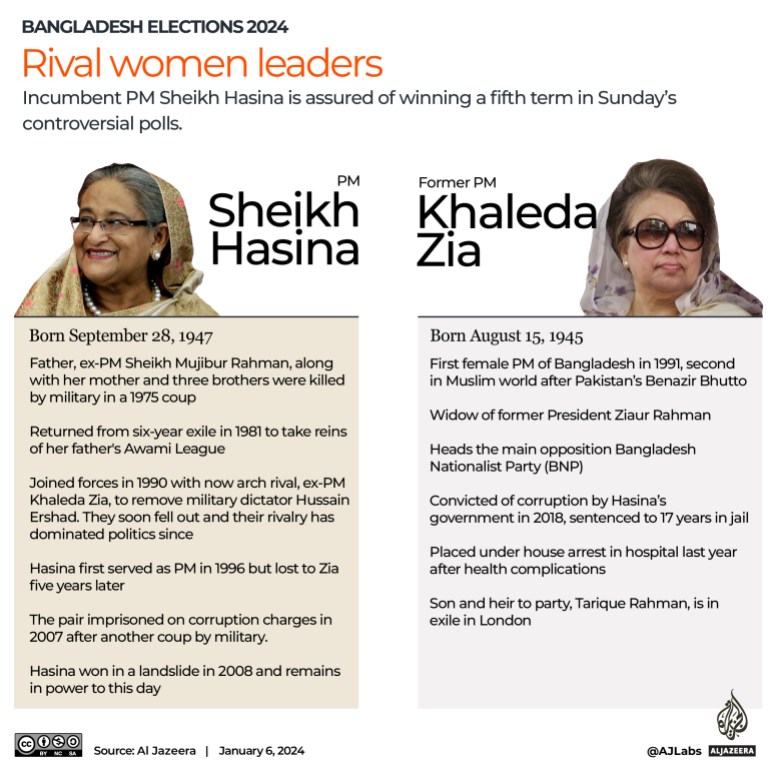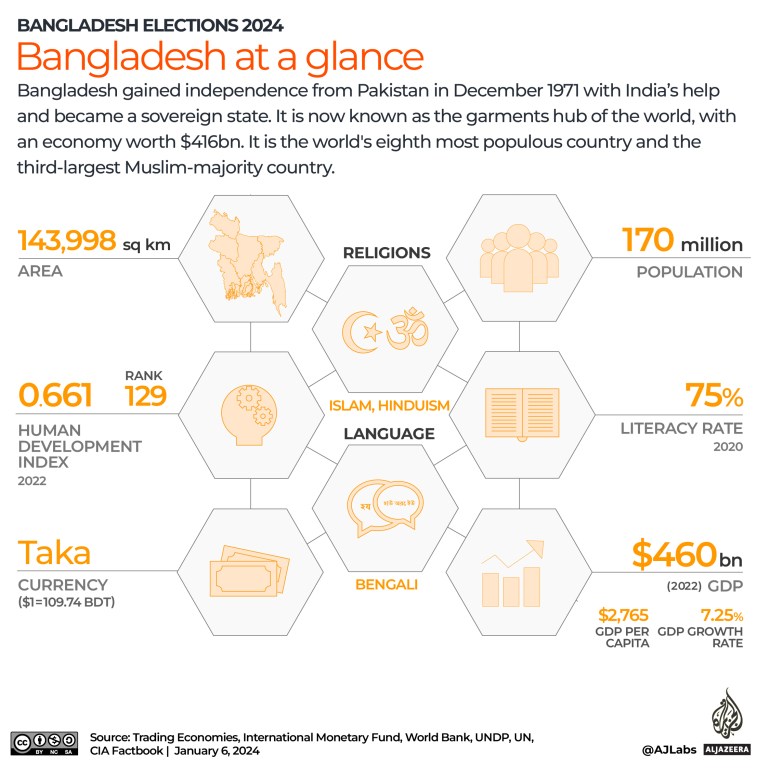Hasina, 76, won a fourth straight term and fifth overall in power by sweeping Sunday’s general election, which was boycotted by the main opposition Bangladesh Nationalist Party (BNP) for the second time in the last three polls.
Hasina branded the main opposition party a “terrorist organisation”.
The daughter of the country’s founding father Sheikh Mujibur Rahman, who led Bangladesh’s independence from Pakistan, Hasina was fortunate to have been visiting Europe when most of her family members were assassinated in a military coup in 1975.
Born in 1947 in southwestern Bangladesh, then East Pakistan, Hasina was the eldest of five children. She graduated with a degree in Bengali literature from Dhaka University in 1973 and gained political experience as a go-between for her father and his student followers.
She returned to Bangladesh from India, where she lived in exile, in 1981 and later joined hands with political foe, BNP chief and former Prime Minister Khaleda Zia, to lead a popular uprising for democracy that toppled military ruler Hossain Mohammad Ershad from power in 1990.
But the alliance with Zia did not last long and the bitter and deep-rooted rivalry between the two women, often called the “battling begums”, went on to dominate Bangladeshi politics for decades.
Hasina first served a term as prime minister in 1996 but lost to Zia five years later. The pair were then imprisoned on corruption charges in 2007 after a coup by a military-backed government.
The charges were dropped and they were free to contest an election the following year. Hasina won in a landslide and has been in power ever since.
As time went on, she became increasingly autocratic and her rule has been marked by mass arrests of political opponents and activists, forced disappearances and extrajudicial killings.
The 78-year-old Zia meanwhile is in ailing health and confined to hospital after corruption charges saw her sentenced to a 17-year prison term in 2018. Top BNP leaders have been sent behind bars while Zia’s eldest son and heir apparent Tarique Rahman is in exile in Britain.
Rights groups have warned of a virtual one-party rule by Hasina’s Awami League.
Hasina refused BNP demands to resign and allow a neutral authority to run the election, accusing the opposition of instigating antigovernment protests that have rocked Dhaka since late October and killed at least 14 people.
Both Hasina and her rivals have accused their opponents of trying to create chaos and violence to thwart political peace and jeopardise the democracy that has yet to take firm root in the South Asian country of 170 million people.
Hasina said she did not need to prove the credibility of the election to anyone. “What is important is if the people of Bangladesh will accept this election.”
Asif Nazrul, professor of law at Dhaka University, told Al Jazeera Hasina is a “shrewd” politician but history will remember her as a leader “who stayed in power through repression, not popular mandate”.
“Never in the history of this region has a politician stayed in power despite lacking people’s mandate,” he said. “In fact, I would call her unpopular now as [Sunday’s] turnout has proven what percentage of people’s support Hasina and her party has.”
Nazrul said Hasina has “set up a milestone before the world on how a leader can establish complete autocracy in a nation in the garb of democracy”.
“But that’s not a legacy one should be proud of,” he said.
Mixed legacy of 15-year rule
Hasina has been praised by supporters for leading Bangladesh through a remarkable economic boom, largely on the back of the mostly female factory workforce powering its garment export industry.
Bangladesh, one of the world’s poorest countries when it gained independence from Pakistan in 1971, has grown an average of more than 6 percent each year since 2009.
Poverty has plummeted and more than 95 percent of the country’s 170 million people now have access to electricity, with per capita income overtaking India in 2021.
Hasina also received international acclaim for opening Bangladesh’s doors to hundreds of thousands of Rohingya refugees fleeing a 2017 military crackdown in neighbouring Myanmar.
She has been hailed for a decisive crackdown on hardline Muslim groups after five homegrown extremists stormed a Dhaka cafe popular with Western expatriates and killed 22 people in 2016.
But Hasina’s intolerance towards dissent has given rise to resentment at home and expressions of concern from the Western powers.
Five top Muslim leaders and a senior opposition figure were executed over the past decade after convictions for crimes against humanity committed during the country’s brutal 1971 liberation war.
Instead of healing the wounds of that conflict, the trials triggered mass protests and deadly clashes. Her opponents branded the trials a farce, saying they were a politically motivated exercise designed to silence dissent.
The United States imposed sanctions on an elite branch of Bangladesh’s security forces and seven of its top officers over charges of widespread human rights abuses.
Meanwhile, the economy has also slowed sharply since the Russia-Ukraine war pushed up prices of fuel and food imports, forcing Bangladesh to turn last year to the International Monetary Fund for a $4.7bn bailout.
Inflation was 9.5 percent in November, one of the highest in decades, and tackling it will be one of Hasina’s biggest challenges in her next term while the spotlight will be on how she deals with upholding democracy.
Munshi Faiz Ahmed, former director-general of Bangladesh Institute of International and Strategic Studies, a state-funded think tank on security and strategic issues, called Hasina “perhaps the most strategic political maneuverer in Bangladesh’s history”.
Ahmed, also a former Bangladeshi ambassador to China, told Al Jazeera that one should be mindful of the conditions in which Hasina operated in the last decade: a massive population cramped in a small land with scant mineral resources, a divided and opinionated public, and continuous pressure from the global and regional powers.
“She skilfully handled all those factors and led Bangladesh to a position of prosperity and importance. As a politician, she is more competent than anyone else in recent history,” he said.
In the aftermath of a tainted election, Ahmed said Hasina had been successful in tackling Western pressure so far and at the same time was able to establish good relations with China, India and Russia – all of which have backed her government.
“It’s no longer a unipolar world, it’s rather multipolar. So, I don’t think her government will face any problem now.”
Faisal Mahmud contributed from Dhaka, Bangladesh.
